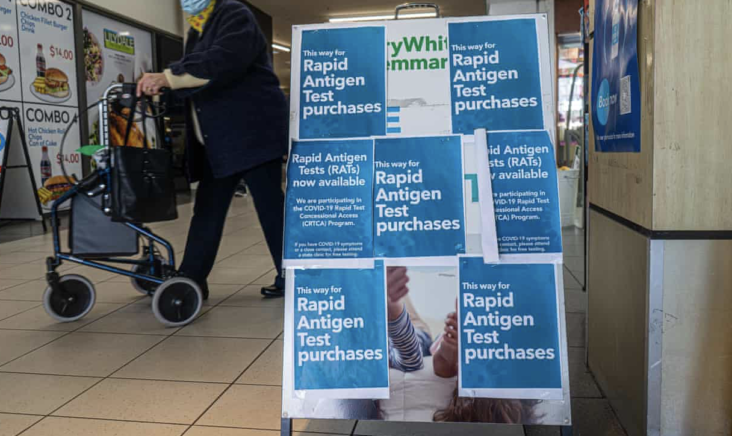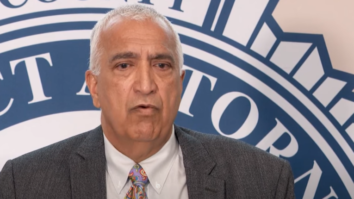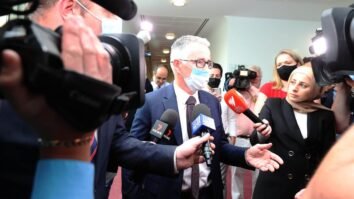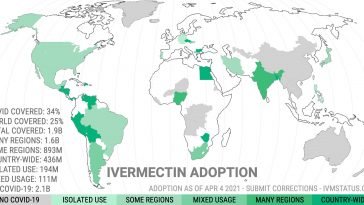The Senate committee that has been examining Australia’s handling of the Covid-19 pandemic has recommended the establishment of a royal commission, arguing the case for a full-blown inquiry with investigative powers is “overwhelming”.
In a report tabled out of parliamentary session on Friday, the Senate’s legal and constitutional affairs committee said a royal commission should be created to examine the key elements of the pandemic’s emergency phase.
These should include virus testing, contact tracing, quarantine protocols, the impact of lockdowns, the procurement of vaccines and the capacity of the health, education, aged care and housing and domestic violence systems to respond to the crisis.
It advocated looking at all this in light of costs and benefits, in order to record lessons to be learned. The report also said the commission should look at the impact of these policies on different sections of the community.
Among the committee’s seven members, the decision to call for a royal commission was not universal.
The Coalition members – whose government under Scott Morrison was in office through the pandemic’s emergency phase – called for the further inquiry, along with the Greens. Members who were part of the Albanese Labor government argued their own now-completed Senate inquiry would suffice.
“There are strong views with respect to a range of issues, including the response of federal and state governments,” the committee’s majority report said. It was “imperative” that Australia learn from Covid-19 in preparing for any future pandemic.
The committee is chaired by the Liberal senator Paul Scarr and has one other Liberal and one Nationals member.
The sole Greens representative, senator David Shoebridge, also endorsed the call.
“When an extraordinary event of the scale of the Covid-19 pandemic occurs it would be foolish not to reflect on how society responded to it, to learn valuable lessons that can be applied in the future,” Shoebridge says in additional remarks in the report.
“A royal commission has the independence needed, including the power to compel answers from often unwilling governments, to give the public confidence that its final report and any recommendations will be credible and unbiased.
“With all the sacrifices we made Australians deserve at least this”.
In disagreeing with the royal commission call, deputy chair and Labor senator Nita Green and fellow Labor senator Varun Ghosh pointed to a separate government-commissioned independent 12-month inquiry into the Covid-19 response, led by Robyn Kruk AO, which is due to report on 30 September.
skip past newsletter promotion
Sign up to Afternoon Update
Our Australian afternoon update breaks down the key stories of the day, telling you what’s happening and why it matters
Privacy Notice: Newsletters may contain info about charities, online ads, and content funded by outside parties. For more information see our Privacy Policy . We use Google reCaptcha to protect our website and the Google Privacy Policy and Terms of Service apply.
after newsletter promotion
Its scope does not include state and territory decisions, including on lockdowns.
The Labor senators said that inquiry will report “significantly earlier than a royal commission would have reported, thereby allowing Australia to learn the lessons of the Covid-19 response and improve our preparedness for future pandemics earlier than a royal commission would have permitted”.
“In recent times, some royal commissions have taken many years – up to half a decade – to report,” they say. The pair argued there was “unnecessary duplication” between the proposed royal commission and “numerous” other inquiries.
The report said there should be particular scrutiny of the policies and practices relating to lockdowns, school closures, social distancing, mask mandates, remote working arrangements, border closures, quarantine rules, vaccine mandates, the vaccine-claims system, governance structures, government decision-making and communications, supply chains, the labour market and business sustainability.
It said a commission should examine the adequacy of planning on the heath, social, economic and human rights implications of the pandemic, the consistency between planning and actual response and the level of coordination between governments.
It also recommended that the federal government encourage the states and territories to pass complementary legislation to allow them to also participate in a national royal commission.
“The committee considers that there is an overwhelming case for the establishment of a Covid-19 royal commission,” the report said.
“The people of Australia deserve an opportunity to learn from the experiences of the Covid-19 pandemic and the response to it.”






















